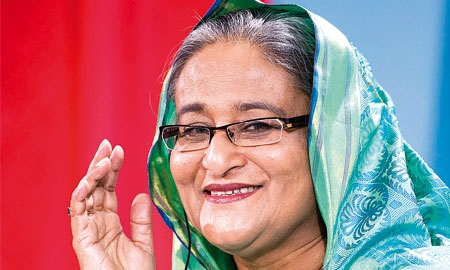When Sheikh Hasina stepped up to the Prime Minister’s office in early 2009, Bangladesh entered into a new era characterised by economic growth, greater self-sufficiency, modernisation and industrial development.
Annual GDP growth was already high, averaging 6 per cent. However, the government took measures to ensure that that figure would remain constant for years to come by introducing measures to improve education, boost agricultural production, enhance the investment climate, strengthen international relations and update infrastructure to allow for greater industrial and commercial expansion.
“We are in a transitional period,” remarks Dilip Barua, Minister of Industries. “In the past, our economy was dominated by foreign aid and trade but now our local economy has transformed into a self-reliant one, and it is based on industry.”
Mr Barua goes on to say that food self-sufficiency is one of the reasons why Bangladesh didn’t succumb to the economic meltdown. Other reasons include the country’s $14 billion in annual remittances, its strong R&D sector upon which many countries in the West depend, its increasing industrial exports and finally, the Bangladeshi mentality to rely on savings rather than credit.
Having overcome many of the challenges the world has faced these past few years, Bangladesh is also getting ready for the future by arming the huge population of youth with the tools they will need tomorrow.
“We are planning to set up multimedia classrooms and computer labs, in spite of electricity shortages,” explains Minister of Information Hasanul Haq Inu. “We are going to use solar panelling to run these labs. We’re training our teachers so they can teach ICT. In another two years’ time, the Government will not employ anybody who does not have computer skills.”
And because Bangladesh is no longer an aid-dependent country, government and businesses alike seek foreign partnerships and investment. The Information Minister points to business process outsourcing (BPO) as an immensely potential sector for the country, given the population’s high level of English.
He also foresees that within the next five years, Bangladesh could very well be a new hub for manufacturing, supported by the new deep-sea port in Sonadia, currently in the planning stage and which has commanded the attention from Chinese, Dutch, Indian and Emirati investors, among others. This future port would ease the burden on the existing ports at Chittagong and Mongla.
Incentives are in place for investors keen to capitalise on Bangladesh’s enormous market (and not to mention the market of northeast India, to which Bangladesh has easy access) and skilled workforce. “Regarding foreign investment facilities, foreign investors will get a three-year tax holiday,” says Minister Barua. “They can send 100 per cent of their profit to their respective countries.”

0 COMMENTS